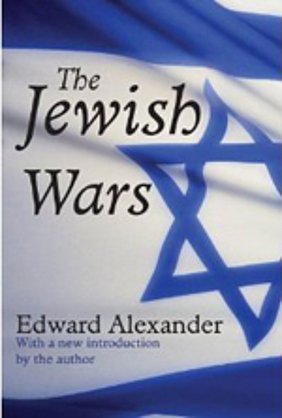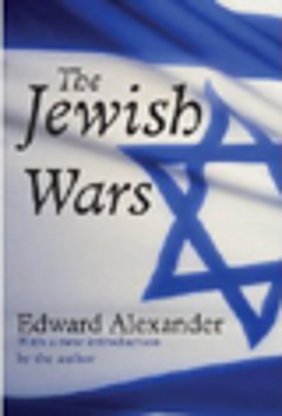At a dinner party in Jerusalem several months ago, one of the guests who was active in Jewish affairs and well informed about culture and politics in Israel remarked that sometime in the 1980s, Israelis had lost confidence in their society and in the Zionist cause. Professor Edward Alexander’s collection of seventeen essays entitled The Jewish Wars, which first appeared in 1996, treats different aspects of this profound change, along with the parallel developments among American Jews. Originally published as individual articles in Commentary, the Congress Monthly, the Seattle Times and other journals and anthologies, these pieces appeared between 1988 and 1994 - between the outbreak of the first Palestinian Armed Uprising in 1987 and a year after the signing of the Oslo Accords in 1993. The essays in The Jewish Wars serve as an excellent source for the Jewish discourse of the 1980s and early 1990s.
Professor Alexander writes with verve and insight. A retired professor of English literature, he is eloquent and resourceful, with a masterful command of language and an elegance of style. He frequently cites European, English, American and Jewish literature which gives his essays depth, wit and culture. While the subjects of his criticism may be odious or annoying, his demolition of their views and messages is beneficial and even pleasant to experience because of his skill at writing. One would not want to be the target of his devastating criticisms.
Alexander includes an updated introduction to the collection alongside the original. It is clear that the subjects that he dealt with cogently and trenchantly in the late 1980s and early 1990s are now even more timely than they were fifteen or twenty years ago. The condemnations of Israel voiced by Israeli authors, such as David Grossman in The Yellow Wind (1987), his publicized journey to the West Bank, persist more stridently than before and no longer remain the property of a few writers and intellectuals. This bitter, unrelenting and unwarranted self-criticism, or perhaps, self-immolation, has become more virulent and has gone mainstream. It has intensified and influenced policy, education and public opinion in Israel and appears in the U.S. as well. Alexander shows that denigration of Israel both by American Jews and Israelis, mainly on the Left, is symbiotic, feeding at the same common trough of ignorance, ideological blindness, wishful thinking, snobbery and pure hatred.
The issues covered in The Jewish Wars include: Israeli anti-Semitism; the place of the Holocaust in Jewish discourse; American Judaism; American Jewry’s relations with Israel; and the new anti-Semitism (before it was given that label in the first decade of the twenty-first century). The essays appear chronologically, almost as a prelude to the final article, entitled “Israel’s Embrace of the PLO: The Beginning of the End,” a review of Shimon Peres’ The New Middle East (1994), a scathing critique of the Oslo Process, whose deleterious results Professor Alexander predicts as he dissects the platitudes of the book. (Unfortunately, most of his predictions have come true.) What kind of intellectual transformation made it possible for Israel, with the encouragement of some leading American Jews, to accept such a great risk and endanger its future? While each essay analyzes a different component of the transformation of public discourse, the whole is the sum of its parts.
Alexander’s conclusions may be summarized as follows: During the eighties, Israeli novelists such as David Grossman, playwrights such as Yehoshua Sobol, and politicians such as the far-Leftist Shulamith Aloni (long-time Knesset member and later Minister of Education), transformed Palestinian Arabs into Jews (“Making Arabs into Jews”). For example, when “Grossman - who was born in 1954-- claims that Arab children who chant, ‘by throwing stones … we will free the motherland’ remind him of Jewish children ‘who sang patriotic songs when British soldiers passed by’, he does not merely mock memory and history, he comes perilously close to those Israelis … who can discover their Jewish identity only by pretending to be Arabs who are themselves pretending to be Jews.”(“Making Arabs into Jews: David Grossman’s The Yellow Wind”, 3)
If Arabs had been transformed into Jews, then Jews became collaborators with Nazis or heirs to Nazi ideas and actions. For example, Yehoshua Sobol’s play, Ghetto, performed in Germany in 1985 by the Haifa Theater was acclaimed by German audiences. And, “many German reviewers spoke gleefully of how the play depicted Jews as ‘accessories to the Holocaust.’” And his play, The Palestinian (1987), demonstrates “that the evil spirit of Nazism found its continuator not in Europe at all but in the very state that had given lodging to those who survived the Holocaust, the state of the Jews themselves.” (“Anti-Semitism: Israeli Style”, (41). While these accusations of Zionism‘s affinity with Nazism had been common in Arab or Soviet propaganda for years, their presentation in Hebrew and in translation gave their advocates authenticity and authority. After all, if Israel’s prominent cultural figures castigate their country as racist and perverted, and the Holocaust as a political manipulation, others could feel free to do so as well, without the stigma of being called anti-Semites.
Furthermore, these critics of Israel demand that Israel be judged by higher standards of morality and behavior than any other country or society. Moreover, Israel must be punished if it cannot be angelic, forgiving and tolerant to those bent upon its destruction and intent upon committing violent acts against Israelis or Jews. In “Why Jews Must Behave Better than Everybody Else: The Theory and Practice of the Double Standard”, Alexander exposes the New York Times’ Anthony Lewis, Flora Lewis and Thomas Friedman. The demands for perfection take an even more strident tone with Desmond Tutu (“Praying for Nazis, Scolding their Victims: Archbishop Tutu’s Christmas Message to Israel”), whom Alexander outs as a hypocrite with “a long record of hostility to Jews, Judaism and Israel” (66).
The third major theme of the book treats various aspects of the direction and content of American Judaism. Alexander takes to task figures such as the [former] editor of MomentMagazine, Leonard Fein and the Orthodox thinker David Novak (“To Mend the Universe or Mind the Vineyard?”); the radical editor of Tikkun, Michael Lerner (“Michael Lerner: The Clintons’ Jewish Rasputin”); and the Professor Robert Alter (“The Nerve of Ruth Wisse”). The diminishing or conditional commitment to the Zionist idea and the State of Israel emerge in all of these essays. Other studies focus on figures such as Noam Chomsky, William Buckley, Edward Said, Alexander Cockburn and Pat Buchanan.
From Alexander’s work, it emerges that there are two pivotal issues upon which contemporary Jewish identity must be defined: the Holocaust and Israel. Both are rooted in attitudes to Jewish history and Klal Yisrael (the collectivity of the Jewish people). If the Holocaust is viewed only in terms of one’s personal experience (“The Holocaust … And Me”) or as something with which one may attack Israel, as in the essays on Grossman, Sobol, and Tutu, mentioned above, or as a questionable historical problem (“Noam Chomsky and Holocaust Denial”), there is a distortion.. A disconnect takes place, and the Jewish dimension of the Holocaust, which is essential for understanding its significance, is negated. Alexander provides a corrective in his masterful “What the Holocaust Does Not Teach” in which he affirms the Jewish aspect of the Shoah and presents the late Professor Lucy Dawidowicz’s contribution to the discussion and her critique of scholarship on the Shoah. As far as Zionism and Israel are concerned, Edward Alexander definitely holds that they are an essential part of Jewish life today, and Diaspora Jews must defend Israel. Alexander implies that without Israel, Jewish existence would be impossible or pointless. Israel and Diaspora continuity combined are the answer to the Shoah.
While the new introduction is solid and includes recent additions to the rogue’s gallery of post-Zionists, defamers of Israel, Holocaust deniers, distorters of history, hypocrites and anti-Semites, it could be longer and more factual. Perhaps, Alexander should have presented a summary of events or chronology of the last three decades. Today’s readers simply do not know what happened during the eighties and nineties and may well be ignorant of the identity of many of the protagonists. In fact, it would have been useful to include a “who's who,”- brief bios of the major figures mentioned in the essays, their importance, their works, their views and their positions or contributions. Furthermore, as some of the articles were written in response to particular statements, books or events, Alexander should have provided more information on the context of the particular piece at the time it was written. Such brief explanations would have improved the reader’s understanding of the articles and the era in which they were written, especially in cases when he includes correspondence and replies to his critics.
On the whole, The Jewish Wars demonstrates that the problems which attended the transformation of the eighties are still with us and must be addressed with greater skill and urgency. This is a valuable work and a good read. While the double standard regarding Israel, the inversion of reality -- Israel as Nazi, Arab as Jew - and delegitimization of Israel have been subjects of numerous books, articles and websites throughout the last decade, Edward Alexander has the distinction of being one of the first to grasp their importance and confront the problem honestly. For that, he deserves credit and gratitude.



